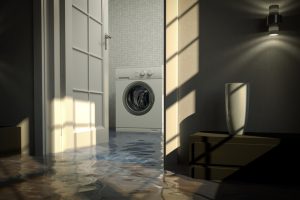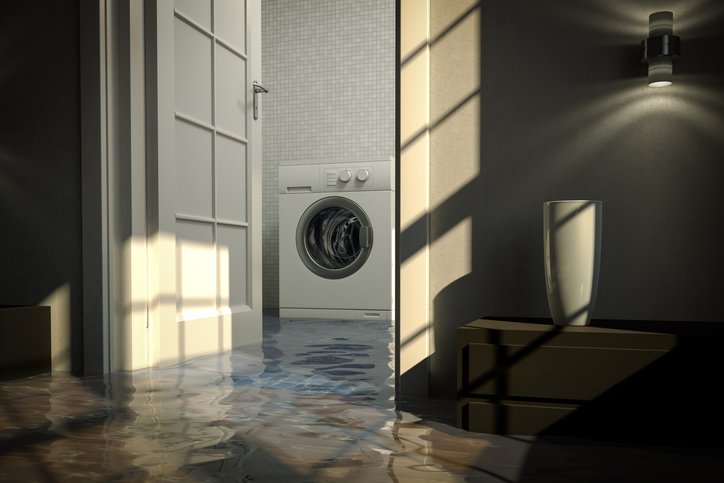 There are many home appliances that we rely on regularly; but when you have a washing machine leak, it can cause major basement flooding problems. Not only do you have the obvious problem of needing to fix the washer, you also have potential for water damage. Consider that older washing machines can use between 10-30 gallons for every load– that’s a lot of mess. While high-efficiency washers use less water, there is still a risk of lots of water pouring onto your floor if there is a malfunction.
There are many home appliances that we rely on regularly; but when you have a washing machine leak, it can cause major basement flooding problems. Not only do you have the obvious problem of needing to fix the washer, you also have potential for water damage. Consider that older washing machines can use between 10-30 gallons for every load– that’s a lot of mess. While high-efficiency washers use less water, there is still a risk of lots of water pouring onto your floor if there is a malfunction.
When the laundry room is in the basement, it brings the risk of increased bacteria and mold growth after a water leak. And plan before you go out of town. Six percent of failures occur when a home is unoccupied and end up being two and a half times more severe.
Common Causes Of Washer Failure
Water moves through the supply lines on the machine at a high pressure. Sometimes, this can cause a weak spot in the hose, especially if it is rubbing against other parts during the vibration of the various cycles. Check the hose for bulging or soft areas, which might indicate a weakness; regular black washing machine hoses are cheaply made and prone to failure. A hose mesh screen blocked with debris or cracked O-rings inside the connection may also cause a leak.
Top-loading washers have a tub gasket, which can have cracks or rotten areas, eventually causing small leaks. Front-loading washers have a strong rubber seal around the door; but if this isn’t cleaned properly and checked frequently, it can prevent the door from sealing completely, allowing water to leak.
Over-sudsing is another common problem that can cause washing machine malfunction during the wash or rinse cycle. Prevent this by using the correct detergent levels for the load size being washed, following the manufacturer’s guidelines.
Plumbing Problems
If your basement floor drain is backing up when you are washing clothes, it is likely due to a blockage in the pipe. Watch the basement drain as the washing machine is running, and if it overflows or backs up as the water is released, there is something clogging the line.
In some cases, basement drains back up or overflow when the washer runs because of the quantity of water. Old plumbing sometimes is not able to handle the rush of water from running a washing machine. When the pipes get overwhelmed by the large volume of water, it causes the basement floor drain to back up or overflow.
Traps keep sewer gases and odor from seeping out because there is constantly water there as a barrier. Usually, the water from the washing machine may be enough to replace the water in the trap. But if it dries up, the smell can rise. If not, all that you need to do is pour water into the drain, and the trap will be filled.
Add A Drain Pan Or A Sensor
Large pans that are plumbed in with drain pipes can be placed underneath your washer to avoid problems. Those pans will not be of any help if the plumbing behind your washer breaks, leaking water into the room and potentially through the walls to damage the framing, drywall and even the electrical.
Water leak detectors and automatic shut-off valves will help to prevent water damage from a leaking washer pipe connection, hot water tank, or a burst water supply pipe. A sensor can be installed in a particular spot where a leak may occur. There are also sensor devices that measure the duration of the water spill, the spill rate, or detect a particular appliance that needs the water supply line shut off.
Professional Water Damage Services In Pittsburgh
When your laundry room floods, hire a qualified water damage specialist with the right equipment for the job. GS Jones specialists will assess which materials to be professionally cleaned, deodorized, or completely replaced. For example, water seeping between the cracks of hardwood or vinyl flooring can ruin the subfloor beneath. Drywall surrounding the area can act like a sponge, soaking water higher up through the wall. If the wall has gotten wet, have the area measured with a moisture meter to determine whether it needs to be replaced.
If your problem is too large to handle quickly on your own, enlist qualified water damage experts. Call G.S. Jones for the equipment, training, and expertise to safely clean and restore your property.

